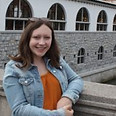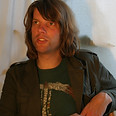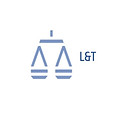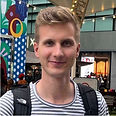
OUR TEAM
Internal members
IMS and Mintlab
Institute for Media Studies and Meaningful Interactions Lab
KU Leuven
The Institute for Media Studies (IMS) produces critical scientific research in four domains: journalism and news, strategic communication, human-computer interaction and media culture. For Gam(e)(a)ble, its expertise in social media, video games, and interaction design are particularly relevant.Within IMS, the Meaningful Interactions Lab (Mintlab) specializes in new technologies and convergence, interactions in online media, as well as design for/with children. Mintlab engages with various stakeholders in a research, design and dissemination process which questions, envisions and encourages interactions through technology that make a difference in people's lives. For Gam(e)(a)ble, IMS and Mintlab collaborate with LUCA School of Arts on WP1 on media research.
Rozane De Cock
Professor, Project supervisor
Rozane De Cock is associate professor in Communication Sciences at the Institute for Media Studies of KU Leuven (Belgium) and director of the Brussels Center for Journalism Studies (BCJS, KU Leuven campus Brussels). She is principal investigator of the SBO-FWO Gam(e)(a)ble research project on the blurring lines between gaming and gambling among teenagers. In her research, she studies news production, news use and news effects next to internet use and riskful issues such as problematic gaming and excessive use of social networking sites.
Tim Smits
Vice-Dean, Professor
Tim Smits is a full professor in persuasion and marketing communication at the KU Leuven Institute for Media Studies and the current vice dean of education at the KU Leuven Faculty of Social Sciences. His research mainly focuses on persuasive processes and psychological effects in marketing communication targeting children and adolescents. The understanding of these techniques can then be used in policy recommendations, but also in a further test of how these techniques can be applied from a social marketing perspective persuading for healthy or socially desirable behaviors.
Maarten Denoo
PhD candidate
As a PhD candidate in Social Sciences (and lifelong enthusiast of gaming), Maarten's media-tech research focuses on unraveling gambling(-like) mechanics and aesthetics in video games towards a clear taxonomy. Are boundaries between gaming and gambling becoming increasingly blurred, and what are the ethical implications of this when it comes to game design?
Bruno Dupont
Postdoctoral research manager
Bruno is in charge of the overall organization of the project: collaborations, scientific agenda, communication, and valorization. Besides this task, he participates in the media research part of Gam(e)(a)ble through bringing up his expertise in game and media studies, particularly from a semiotic and media education point of view. His research interests include depictions of video games in media, intermedia phenomena, and video game literacy.
Bieke Zaman
Professor, Project supervisor
Bieke's work lies primarily at the intersection of human-computer interaction research and communication sciences. She is research group leader of the Meaningful Interactions Lab (Mintlab), part of the Institute for Media Studies at the Faculty of Social Sciences, KU Leuven, Belgium.
Eva Grosemans
PhD candidate
Eva graduated as a Master in Communication Sciences at KU Leuven. She also holds a Masters degree in Management and Business Economics. In her studies, Eva always had a strong interest in advertising, marketing, and persuasive techniques.
Now, as a PhD Candidate at Mintlab and IMS (KU Leuven), she will focus on the different persuasive media techniques (including ads, sponsorship, and social media influencers) used to advertise games that include gambling elements.
Nadia Feci
PhD candidate
Working on media law, commercial communication and data protection law. Taking care within Gam(e)(a)ble of the legal aspects and issues related to the merging of gaming and gambling. PhD project looking at the topic through an audiovisual media lens, specifically focusing on user-generated content creators. Independent member of the Flemish Sectoral Council for Media, discussing media policy and providing the Flemish Government and Parliament with advice.
Peggy Valcke
Professor, WP lead
Peggy Valcke is vice dean research at the Leuven Faculty of Law & Criminology. She is co-director of CiTiP and principal investigator in the Security & Privacy Department of imec (previously iMinds). She has a broad experience with international and interdisciplinary research - both fundamental and applied - dealing with legal aspects of IT and media innovation. Her current research focuses on the rise of artificial intelligence, in particular algorithmic decision-making, in law enforcement, transport, media services, the judiciary, etc., and the ethical-legal implications thereof, especially in relation to human rights and the allocation of responsibilities / legal liabilities.
Valerie Verdoodt
Postdoctoral researcher
Postdoctoral Fellow at the London School of Economics and an Affiliate Fellow at both CiTiP (KU Leuven) and Law and Technology (Ghent University). Valerie's research interests lie in the fields of Human Rights, IT and Media Law, with a particular focus on children’s rights in the digital environment. At LSE, Valerie teaches ‘Information Technology and the Law’, ‘Digital Rights’, ‘Cyberlaw’ and ‘EU Law’
Inclusive Society
UCLL
As a centre of expertise, Inclusive Society employs a participatory and empowering research methodology. It works in co-creation with (vulnerable) citizens, schools, organizations and companies. Inclusive Society researchers always work powerfully and diversity-sensitively. The centre's projects start from concrete needs, drawing inspiration from national and international models, literature and research.
Maya Geudens
Researcher
Maya has a Master’s degree in Psychological Sciences. She is a clinical psychologist, specializing in adolescents, young adults, and parents of children struggling with problematic gaming behavior. Additionally, she works as a researcher within the Gam(e)(a)ble project. Her focus mainly lies on the prevention of problematic gaming and gambling in youth. In this way she bridges the gap between science and practice.
Flore Geukens
Researcher
Flore graduated as a clinical psychologist from UGent. After this, she obtained her Ph.D. in Psychology. During this four-year period, she researched loneliness in youth (cognitive, physiological and social processes). Her research at UCLL focuses on how we can make our society more inclusive for all individuals regardless of their gender, sexual orientation, physical or mental disability and so on.
Developmental Psychology Research Group
UGent
The group pursues two main objectives: gaining an insight in normal human psychological development and examining which factors may affect individuals’ optimal and psychopathological functioning. Its researchers study how the social environment is linked with developmental outcomes. The group has a preference for longitudinal research, suited to map out the complex and dynamic processes of human development. Within Gam(e)(a)ble, the group takes care of the psychological aspects of gaming and gambling.
Lowie Bradt
PhD candidate
Lowie graduated in psychology and has a strong interest in human development, motivation and behavioral economics. Within the Gam(e)(a)ble project, he will focus on the role that psychological factors can play in the link between gaming and gambling. A core element in his research is the parent-child interaction.
Bart Soenens
Professor, WP lead
Bart's research takes place at the crossroads of developmental psychology and motivational psychology. He mainly studies parent-child relationship and the role of education in various domains of children's and adolescents' development: identity building, emotion regulation, and personality development.
LUCA
School of Arts
LUCA leads on inspiring and facilitating research across visual arts, audiovisual arts, performing arts, music and design. Within LUCA, the research unit Inter-Actions bundles research groups focusing on design and artistic research, and exploring the possibilities of old and new materials, artefacts, media, spaces and events.For Gam(e)(a)ble, the expertise of the unit in the design of meaningful game and interaction rules will contribute to our Media Sciences objectives.
Steven Malliet
Lecturer and researcher
Steven is active in several artistic research projects that involve the creation of game and interaction rules. His academic research addresses the socio-psychological determinants of digital game play and the methodology of game text analysis. Within Gam(e)(a)ble, he is part of the Media team and co-supervisor of the research line that investigates Dark Design patterns in contemporary games.
Law & Technology
UGent
The fundamental research conducted in the field of Law & Technology aims to answer the acutelegal questions raised by the speed and extent to which new technologies are created, used and embedded in professional and private spheres focuses on understanding, interpreting and critically evaluating the legal impact of technology and technology-based or technology-facilitated processes and behaviours, and the potential of technology to facilitate or enrich legal processes or proceduresIn both strands of research, a human rights-based and interdisciplinary approach is adopted.
Pieterjan Declerck
PhD candidate
Pieterjan is affiliated with the department of Interdisciplinary Study of Law, Private Law and Business Law. He obtained the Master of Laws Degree at Ghent University cum laude in 2020, with focus on international trade and environmental law, data protection and IP-law, and EU Law & Technology
His contribution to this interdisciplinary project is to assess the legal framework in which both gaming and gambling operate and how this framework could (better) tackle the related issues in the future.
.
Eva Lievens
Associate Professor
Eva Lievens is Associate Professor of Law & Technology at the Faculty of Law and Criminology and a member of the Human Rights Centre, the UGent Human Rights Research Network, the Crime, Criminology & Criminal Policy Consortium, DELTA, ANSER and PIXLES. A recurrent focus in her research relates to the legal impact of the design and deployment of technology in today’s society, human and children’s rights in the digital environment, and the use of alternative regulatory instruments, such as self- and co-regulation to regulate tech phenomena. Eva teaches ‘European Media Law’, ‘European Law & ICT’, ‘Cybercrime, Technology & Surveillance’, and ‘Data Protection Law’.
External members
Niels Bibert
PhD candidate, KU Leuven
Niels Bibert is a PhD Candidate at the Institute for Media Studies - Meaningful Interactions Lab and a teaching assistant for the department of Communication Sciences at KU Leuven. In his PhD project, he will be exploring the (Belgian) sports betting landscape from a deep mediatization point of view. More information on the project
Leon Y. Xiao
PhD candidate, IT University of Copenhagen
Leon is researching the regulation of loot boxes. He visited the Gam(e)(a)ble project in June 2022 to assess whether the Belgian gambling regulator’s ban on loot boxes was effectively enforced. His contribution to this interdisciplinary project is to assess the legal framework in which both gaming and gambling operate and how this framework could (better) tackle the related issues in the future.
.
Elena Petrovskaya
PhD candidate, University of York
Elena is a PhD Researcher at the University of York. Her research focuses on problematic microtransactions in games and their possible effects on player wellbeing. She visited the Gam(e)(a)ble project in December 2022 and is working on ongoing collaborations with the consortium,including a study on developer perspectives on self-regulation.
Victor van de Gevel
Former Gam(e)(a)ble visiting scholar
Victor van de Gevel has been a visiting scholar within Gam(e)(a)ble in fall 2023.
His background is in Artificial Intelligence and Human-Technology Interaction.
During his visit, he worked on the development of prevention programs for problematic behaviour regarding the intersection of gaming and gambling.
His research interests include human-AI collaboration, machine creativity, and technology for improving the well-being of people.
.



























